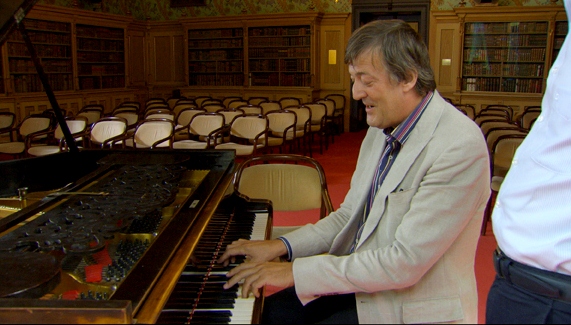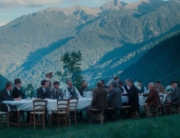
Stephen Fry plays Richard Wagner's piano at Haus Wahnfried in Bayreuth, Germany (Wavelength Films/First Run Features)
Based on countless movies, the music of Richard Wagner (Hitler’s favorite composer) has a long road ahead to break away from its militaristic bombast and fascist taint. Lina Wertmüller used “Flight of the Valkyries” to accompany a Nazi death camp montage in Seven Beauties, and the same score was used for a napalm attack sequence in Apocalypse Now. In contrast, David Cronenberg’s A Dangerous Method stands out for wringing Wagner’s monumental “Ring Cycle” for psychological nuance—Keira Knightley and Michael Fassbender discuss its themes and separate the saga’s Nordic myth from the psychological motivations in the operas. But then again, that film was set 20 years before the rise of Nazi Germany.
The on-screen narrator, British actor/writer/director Stephen Fry, tackles head-on the question—can you separate the composer from the man, who was an all-out anti-Semite? Can you sever him from Hitler’s hip? Fry, who is Jewish, lost relatives in the Holocaust. Though his mind seems made up from the outset that, yes, you can still love the music and be repelled by the man who wrote the essay/racist rant “Jewishness in Music,” Fry lucidly explains in this lean and convincing documentary/opinion piece why Wagner moves him in a way that no other composer ever has, despite the music’s association with the Third Reich. Though Wagner died before Hitler was born, his descendants became extremely close friends to the dictator, who was an honored guest at the annual Bayreuth Festival, devoted only to operas by Wagner. (For more on the clan’s close ties to Hitler, read The Wagner Clan by Jonathan Carr.)
The film’s strongest piece of evidence aids Fry’s case: the music. Newcomers only familiar with “Valkyries” might be surprised by how emotional and sensuous it can be. The love duet in act one of Die Walküre is one of the most beautiful duets in all opera, though if you think about the onstage drama too long, you may have to overlook something else that’s queasy, beside Wagner’s well-documented personal views: the lovers are adult twin brother and sister.
Fry chats with historians; Wagner’s great-granddaughter, Eva Wagner-Pasquier; and a cellist who survived Auschwitz, where some of Fry’s relatives died. All of them guide Fry through his exploration, though Fry’s overall argument would have been given a boost had he interviewed Israeli Daniel Barenboim, conductor at La Scala, the Berlin State Opera, and the Berlin State Orchestra. He has long fought (with considerable success) against the ban on Wagner in Israel, and as an international proponent for the music, he might have sealed the deal for any who, somehow, have the willpower to resist the lure of “Die Liebestod” from Tristan und Isolde.
Even for Ring-nuts who may know the salient points of Wagner’s life—his liberal and revolutionary politics, Swiss exile, love affairs, the patronage of King Ludwig of Bavaria—there will be a vicarious thrill traveling along with Fry to Bayreuth, Germany, to the opera house that Wagner built. There’s reportedly a waiting list for tickets seven years long. Fry practically salivates as he enters the theater, which he calls a temple, “the holy of holies.” He goes so far as to call the Ring Cycle, which debuted in its totality in 1876 after a two-decade gestation, the “artistic event of the century.”
This concise and affable manifesto is a perfect companion to Susan Froemke and Bob Eisenhardt’s’s exposé and promo for the Metropolitan Opera’s latest “Ring Cycle” production, Wagner’s Dream, which gives the viewer a greater idea of the challenges a company faces mounting the 18-hour “Ring” opus. Needed: a rainbow bridge, fire breathing dragon, horses that fly, underwater singing Rhinemaidens, and so on. That film, seen on PBS, steered clear of Wagner’s biography, and Wagner & Me fills in that gap very well by putting Wagner’s music and its popularity in historical context, including how Nazism “stained” (Fry’s words) Wagner’s music. The composer has no better advocate than Fry, who throws down the claim, “The music is bigger and better than Hitler ever imagined.”






Leave A Comment